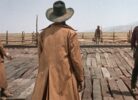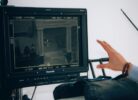To celebrate the upcoming release of my book, Akira Kurosawa: A Viewer’s Guide, due out Dec. 15 from Rowman & Littlefield — preorder here! — I’ll be doing capsule reviews all month covering every single Kurosawa film and posting (very) brief excerpts. These will be short impressions and recommendations, nothing more. For a full, detailed analysis of each, grab the book!
Rhapsody in August (1991)
In his final years, Akira Kurosawa was tremendously concerned with the idea of legacy: what we leave behind and what our life meant. These ideas first started appearing in Dersu Uzala and Kagemusha, and then were amplified in Ran and Dreams. These are all movies that present the idea that we must confront our past in some fashion.
The topic is front and center here, too. Rhapsody in August looks at several generations of a Japanese family and explores how the shadow of the Nagasaki bombing still hangs over all of them, even grandchildren born decades after the attack. Here, a grandmother struggles with horrific memories; her grandchildren come to better understand why their elders are still affected by the tragedy; and distant family signal the start of healing. It’s a small, personal work arguably best known in the west for featuring American movie star Richard Gere, despite Gere’s role being a small one.
The film is an interesting case, one that springs from past events but that looks at them through a modern lens. From the book:
In many ways, Rhapsody in August is Kurosawa’s last post-war film, a throwback to the era when he was examining the myriad ways World War II impacted the Japanese populace, but this time viewed from the distance of contemporary times. His final picture, Madadayo, would actually be set in the postwar years, but the issues it confronts are primarily those of self. Through the lens of family, Rhapsody in August sets its sights on larger ideas, and despite it being a contemporary work, is in keeping with his work of the late 1940s and early 1950s.
Despite its compelling themes, Rhapsody in August is not an essential work for the more casual Kurosawa fan. It’s quite worthwhile for the viewer who wants to better understand his overlooked late period, but other viewers are probably better off saving this one for after they’ve seen most of his landmark works. Not only does it fail to reach those great heights, this exploration of legacy is better experienced after you’ve seen what came before. That context is key.
Check out my upcoming book for a full analysis exploring this film’s ideas, themes, good points, and bad
You can get the movie in this home release.







